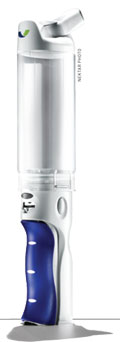
Nature: Bitter pill: disappointing results have seen Hank McKinnell (left) removed as Pfizer's chief executive to make way for Jeff Kindler.
"But despite the generally upbeat reaction to Kindler's appointment, the value of Pfizer's stock has remained unmoved. And close observers of the company question whether the appointment will do much to change its outlook."
(I guess that's me.)
"Like other major pharmaceutical firms, Pfizer is in a hole. Patents will soon run out on its major products, including the world's best-selling drug, cholesterol treatment Lipitor (atorvastatin). "They need to generate $10 billion in extra revenue each year and that's impossible," says Peter Rost, a former vice-president of Pfizer who runs a carping blog, http://peterrost.blogspot.com, on its predicament. "The only way they can stay afloat is as a black hole, sucking in other companies to boost revenue. I think they are going to collapse under their own weight."
So why would I say such a thing?
Simple.
Pfizer had eight drugs with more than a billion dollars in sales in 2005 (down from 10 in 2004), including Lipitor ($12 billion), Norvasc, a therapy for high blood pressure ($4.7 billion), Zoloft ($3.3 billion), Celebrex ($1.7 billion), Zithromax ($2 billion), and Viagra ($1.6 billion). Those eight drugs also account for nearly 60% of the company's human health segment sales (down from 70% in 2004).
Pfizer's revenues from these establish blockbusters continue to slide due to one of the pitfalls of the drug business: patent expiration. The company has warned investors it will probably lose some $14 billion due to patent expirations over the next two years; because of patent expirations in 2005, revenues from Zithromax slipped 40%, Accupril dropped 56%, Neurontin was down 77%; and Diflulcan, 47%. Additional losses from the blows to Celebrex and Bextra didn't help either; this double punch reduced revenues by nearly $6 billion.
The hubris driven druggernaut is confident that by 2007 it will be able to launch new blockbusters from its "robust pipeline" (hahahaha) to make up for the losses.
But, take a look at early sales of the company's seven new medicines released in 2005 -- Inspira, Caduet, Olmetec, Macugen, Revatio, Zmax (an extended dose variation of Zithromax still under patent protection), and Lyrica -- most of which were developed with partners and only contribute a portion of their revenues to Pfizer's bottom line, hardly look to be any big blockbusters. In fact, 2006 doesn't look to be much brighter for Pfizer: Zmax's sales are feeling pressure from the generic version of Zithromax. Additionally, both Lipitor and Zoloft face strong competition from other companies' generic treatments.
In early 2005, Pfizer announced plans to cut $4 billion in costs by restructuring certain divisions, including its US sales division and will have to continue to tighten its belt internally in 2006.
That "robust pipeline" includes some 225 projects in development (about 150 new drugs and about 75 enhancements to existing products), including drugs for atherosclerosis, diabetes, osteoporosis, breast cancer, epilepsy, anxiety disorders, and Parkinson's disease.
 Pfizer has relied on acquisitions and partnerships to build its R&D activities. Pfizer has applied to the FDA to market cessation drug Champix, antifungal Eraxis, insomnia treatment Indiplon, and Zeven, a powerful intravenous antibiotic. Stutent, used to treat kidney and gastrointestinal stromal tumors, was approved by the FDA in January 2006.
Pfizer has relied on acquisitions and partnerships to build its R&D activities. Pfizer has applied to the FDA to market cessation drug Champix, antifungal Eraxis, insomnia treatment Indiplon, and Zeven, a powerful intravenous antibiotic. Stutent, used to treat kidney and gastrointestinal stromal tumors, was approved by the FDA in January 2006.And this year Exubera was launched, an insulin inhaler used for the treatment of type 1 and type 2 diabetes that has blockbuster potential. According to Pfizer.
But look at the Exubra inhaler! It is BIG. A foot long, when unfolded, which makes it feel like a baseball bat. Think your girlfriend would like to haul that out of her handbag while seated in a restaurant?
Common sense, folks. Common sense. NO ONE would be caught dead with this foot long pocket rocket in their pocket. Or handbag.
And of course, Pfizer is buying other companies.
Pfizer's latest acquisitions included the purchase of Angiosyn, a private biotech working on an anti-angiogenesis therapy for macular degeneration, which can lead to blindness and Idun Pharmaceuticals, which is developing apoptosis (programmed cell death) inhibitors to treat liver disease, cancer, and other diseases.
The company is also sucking up the research divisions of QuoreX, which develops anti-bacterial drugs targeting hospital infections; research partner Vicuron Pharmaceuticals, which has two anti-infective (anidulafungin and dalbavancin) drugs under review by the FDA; and Bioren, which has developed a technology that helps drugs last longer through antibody optimization.
Pfizer says it plans to spend about $4 billion on acquisitions in 2006 in order to beef up its pipeline. In 2006 the company announced plans to acquire Rinat Neuroscience, a company developing drugs for pain, Alzheimer's disease, and other neurological disorders. Pfizer hopes the purchase will help it gain ground in the biotechnology sector.
So is Pfizer turning into a black hole?
Noooooooooo.
Pfizer is a black hole!
And as long as they can keep it going the deck of cards will remain standing and the Ponzi scheme will go on. But the day they don't find another company to dismantle, it is all over. And they will fall down under their own weight.
That day is coming closer.
Bloomberg recently announced that "Pfizer's AAA Credit Ratings Are in Jeopardy, Bond Prices Show "
They write: "Pfizer was dealt a blow on Aug. 2, when the U.S. Court of Appeals for the Federal Circuit in Washington invalidated a patent on Lipitor that expires in June 2011.
The ruling means Pfizer may face generic competition to Lipitor, which accounts for as much as 40 percent of the company's profits, a year earlier than analysts forecast.
Cheaper copies of the Zocor cholesterol pill captured 9.3 percent of the U.S. market in the first week after Merck's patent expired June 23. Lipitor's share fell to 30.6 percent from 32.8 percent at the same time.
``There's a bit of concern surrounding patent expirations and pipeline prospects,'' meaning new products, said Maryann Hennessey, analyst at bond-research firm CreditSights Inc. in New York. ``You've got the whole Lipitor patent expiration issue, which is a big overhang. And, well what are they going to do to enhance shareholder value?''
A bit of concern. You could say that.
Meanwhile Wall Street is trying to trick the public into buying Pfizer stock again.
I guess they think we're all suckers.
4 comments:
Druggernaut. Loved that one, butt ida spelt it druggernut. Fun to make up words, isn't it?
The pocket rocket bit was amusing as well. Oh, I got nothin', but it seems someone had to get the comments going, so...
Glad you liked it.
I figured I had to give a more complete story than the short one in Nature.
Druggernut. Really like that too.
Rost go work for an investment bank!
Actually an Investment Bank might now want the good Doctor. It's their business to get people to invest and then collect the commission, so the more investment, even in poor investments, is what they live for.
He should become a drug investment CONSULTANT. Tell potential investors the truth about products and any possible problems both immediately and in the future.
If I was worth more than the two quarters I have in my pockets, I would rather invest in honestly discussed stocks, etc. and make smaller profits over time vs the possibility of a huge profit right away or bankruptcy right away.
OH well I don't know nothing bout no stocks n stuff anyway.
Post a Comment